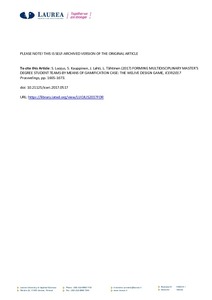Forming multidisciplinary master's degree student teams by means of gamification case : the WeLive design game
Luojus, Satu; Kauppinen, Sami; Lahti, Janne; Tähtinen, Lassi (2017)
Luojus, Satu
Kauppinen, Sami
Lahti, Janne
Tähtinen, Lassi
International Academy of Technology, Education and Development
2017
Julkaisun pysyvä osoite on
https://urn.fi/URN:NBN:fi:amk-2017121921949
https://urn.fi/URN:NBN:fi:amk-2017121921949
Tiivistelmä
New innovations arise as a result of dialogue between multidisciplinary design team and end users. Interaction among designers and users, where the most collaborative and descriptive methods and tools are used to achieve common understanding, can be regarded as an essential part of a high-quality design process. The service design approach has been widely disseminated and rapidly adapted among designers, because the service design methods and tools have proven to be very powerful in bringing users and the service experience into the focus of service development process. Open innovation approach that utilize service design methods can be seen as an extension of service design approach which involves a broader group of stakeholders (e.g. academia) into the innovation process.
Research and development (R&D) projects are not organised by distinctly categorized disciplinarians. Usually competences of various disciplines are needed. Creation of multidisciplinary project teams is one of Laurea’s (Laurea University of Applied Sciences) main objectives when integrating higher education teaching and R&D projects. Forming teams of students with different educational backgrounds, and familiarizing them with new complex concepts requires finding creative and effective pedagogical methods and tools.
The pedagogical starting point for integrating higher education teaching and R&D projects is a pedagogical model, Learning by Developing (LbD), that is based on learning through research and developing. Expertise and experiences are shared between teachers and multidisciplinary student teams as well as project partners and other stakeholders. While working in the project teams, students take part as equal partners bringing their expertise with them. The teacher members of the project team take part by providing their expertise to steer the progress of the work and, at the same time, the progress of learning.
Design is a social process of achieving consensus among participants with different backgrounds and interests. Design games is a service design method that aims at inspire and help facilitating design process. The aim of the design games is to create a forum for the meeting of designers and users as well as provide tools for making their empirical tacit knowledge visible. This paper introduces design game method that aims to help multidisciplinary students in co-design workshops to create their common perspective to the design challenge, as well as to innovate and to develop more concrete and detailed digital service concepts.
Originally the WeLive design game was created for the WeLive project. WeLive applies the service design approach to deliver next generation personalised digital services to citizens. The WeLive design game was used and evaluated in twelve workshops and in total 233 students took part. The design game provided a practical introduction to the project and helped students to forming a group.
The results highlight that design games is an excellent method to involve students to the open innovation process and ease their abilities to understand new complex concepts (e.g. open data) and form coherent digital service concepts in relatively short time. The WeLive design game is extensively transferable to targets outside the WeLive project and it have has been successfully used in forming groups in during different study unit’s than actual targeted.
Research and development (R&D) projects are not organised by distinctly categorized disciplinarians. Usually competences of various disciplines are needed. Creation of multidisciplinary project teams is one of Laurea’s (Laurea University of Applied Sciences) main objectives when integrating higher education teaching and R&D projects. Forming teams of students with different educational backgrounds, and familiarizing them with new complex concepts requires finding creative and effective pedagogical methods and tools.
The pedagogical starting point for integrating higher education teaching and R&D projects is a pedagogical model, Learning by Developing (LbD), that is based on learning through research and developing. Expertise and experiences are shared between teachers and multidisciplinary student teams as well as project partners and other stakeholders. While working in the project teams, students take part as equal partners bringing their expertise with them. The teacher members of the project team take part by providing their expertise to steer the progress of the work and, at the same time, the progress of learning.
Design is a social process of achieving consensus among participants with different backgrounds and interests. Design games is a service design method that aims at inspire and help facilitating design process. The aim of the design games is to create a forum for the meeting of designers and users as well as provide tools for making their empirical tacit knowledge visible. This paper introduces design game method that aims to help multidisciplinary students in co-design workshops to create their common perspective to the design challenge, as well as to innovate and to develop more concrete and detailed digital service concepts.
Originally the WeLive design game was created for the WeLive project. WeLive applies the service design approach to deliver next generation personalised digital services to citizens. The WeLive design game was used and evaluated in twelve workshops and in total 233 students took part. The design game provided a practical introduction to the project and helped students to forming a group.
The results highlight that design games is an excellent method to involve students to the open innovation process and ease their abilities to understand new complex concepts (e.g. open data) and form coherent digital service concepts in relatively short time. The WeLive design game is extensively transferable to targets outside the WeLive project and it have has been successfully used in forming groups in during different study unit’s than actual targeted.
